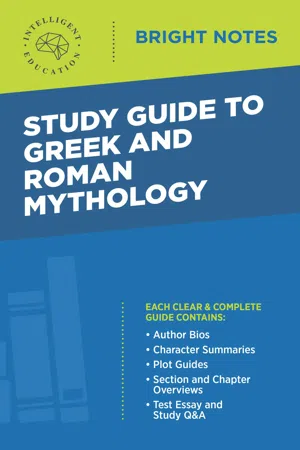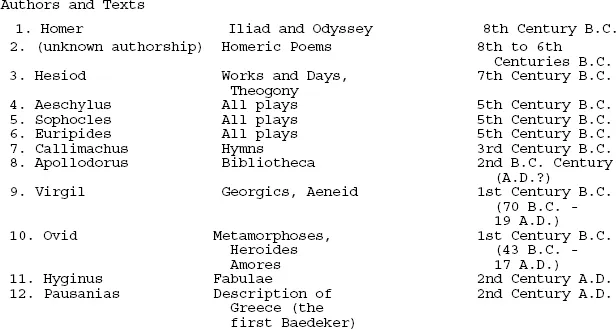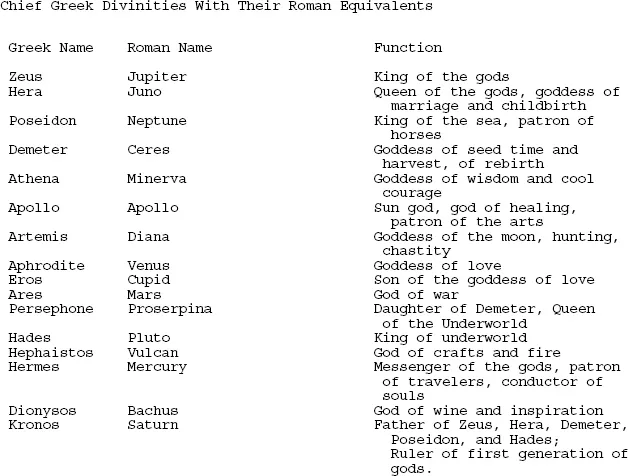![]()
GREEK AND ROMAN MYTHOLOGY
INTRODUCTION
PREFACE
In a book of this nature which deals with people and places of foreign tongues, one of the first problems to be solved is that of orthography. In dealing with the Greek myths, the modern trend is to use the nearest equivalent to the Greek letters as possible. For centuries in the West, however, all the Greek myths have been told with Latinized names, so that the spelling of Kassandra with a K (Greek) may come as a shock to those who are used to seeing it spelled Cassandra in every text book they read. In these pages, a compromise has been made so that the most familiar names, like Achilles or Aeneas, have been left in their Latinized forms, instead of Achilleus or Aineias. This practice has been followed with most geographical names also: for example, the Latin form Boeotia instead of the Greek form Boiotia. The basic differences are (1) the use of the Greek k for the hard c in the Latinized spelling; (2) the Greek diphthong ai instead of the Latin ae; and (3) the Greek diphthong oi instead of the Latin oe. In Anglicizing the pronunciation of Greek and Latin words, all four diphthongs ai, ae, oi, oe, are pronounced like a double e. Since the gods and heroes and legends are Greek, it is only correct to give them Greek spelling whenever possible.
AUTHORS AND TEXTS
The stories of the Greek myths were written by many authors, the most important of whom are listed below, with their approximate dates. It is generally true that the later the author, the more complicated the myth, and the greater the emphasis on etiology - the causes or origins of things.
The following table presents the Greek and Roman names of the mythological deities and gives their primary functions.
DIVINITIES PECULIAR TO THE ROMANS
Janus: god of gates and doorways with two faces which allowed him to look at the exterior and interior of buildings; god of departures and returns, god of beginnings. The gates of his temple were open in times of war, and closed in times of peace.
Vesta: goddess of the eternal flame which was kept burning in her temple by the Vestal virgins.
Lares And Penates: household gods, the guardian spirits of the family, with little shrines in every home. Special sacrifices were offered to them on important family occasions.
Genius And Juno: (the latter not to be confused with the wife of Jupiter) guardian spirits of the individual; Genius for a boy, Juno for a girl.
INTRODUCTION: MAN, MYTH AND HISTORY
It is extremely important not to confuse mythology with either religion or epic poetry, although it partakes of elements of the former, and is usually preserved in the latter. Actually, myth is the accumulation of wisdom of a given society, the collective experience of a cultural group. Since societies are made of human beings, and all human beings advanced enough in civilization to have a “culture” are preoccupied with some of the same problems - birth, life, death, and the attempt to understand nature - all myths will have some of the same basic themes in all cultures.
THE CREATION
Such themes are first of all, the Story of Creation, comprising three elements: (1) cosmogony, or birth of gods out of nothing; (2) an epoch of warfare; (3) a victor who establishes order, assumes command as chief deity, and creates man to serve the gods. Even the creation story in Genesis in the Bible corresponds to this outline, except that there is only one deity (if one discounts the devil), rather than a plurality.
THE GREAT SEARCH
A second fundamental theme is that of the Great Search, the mythic wandering of an individual on a quest which invariably involves monsters, enchantresses, and some kind of experience with the world of the dead. The most important point for the hero to prove on such a quest is his manhood, which in true myth, is above “virtue.” For “good” is a variable with a given culture, and cannot be measured for all cultures by the same standard. The individual is also involved in the conflict between personal choice and social order.
HISTORICAL EVENTS
A third mythical theme is the Aggrandizing of an Actual Historical Event, such as the collapse of the brilliant Mycenaean civilization, or the great migrations. There are of course other themes, less broad in scope, which are similar in the mythology of different cultures - but the point of their universality is clear.
The direction these themes take, however, their emphasis, or “moral,” can be quite different for each culture. The Teutonic - Scandinavian myths stress resistance to all odds and a defiance of ruin. Insults must be atoned for by manslaughter, and manslaughter by revenge. Such heroism is a kind of freedom, but the concept is a negative one, and totally alien to the Greek ideal. It is true that many of the Greek myths deal with revenge, which is necessary because otherwise a curse descends from father to son. But always, atonement finally puts an end to the curse, and even the murders that are committed are never vindictive or deliberately brutal, but occur because the “will of the gods” must be done. The Norse hero can only prove himself by dying; the Greek hero by creating - a city, an institution, or at least something living, like a tree or a fountain or a flower. Eastern mythology, on the other hand, places its stress on the totally irrational world of magic, incarnations, spells, and transformations, heavily overlaid with allegorical significance and contrived symbolism.
MYTH AND HISTORY
Although themes may be virtually identical, while their emphasis may be different in different cultures, myth should never be considered as a sort of veiled history of a people. This is because history, in the words of Lord Raglan in his book, The Hero (p. 4), “is the recital in chronological sequence of events that are known to have occurred. Without precise chronology there can be no history, since the essence of history is the relation of events in their correct sequence.” Archeological remains can be dated, but generally not closer than - give or take - fifty years. For most cultures, at least, a vague history can be worked out after scrupulous study and comparison of archeological findings. But in myth, who came first? Jason, Orpheus, or Theseus? Myth cannot be dated; it is universal, transcending history. It is the summation of wisdom of a people gained from past events and rituals, given permanent form by the imagination of poets who could thus transmit themes and beliefs already in existence to posterity.
![]()
GREEK AND ROMAN MYTHOLOGY
THE CREATION AND THE PRE-OLYMPIANS
Back At The Beginning of all things, before even Time began, there was only Chaos brooding over the darkness. Nothing had form; there was no light; there was no life. At last, slowly, the Earth, Gaia, the darkness under the Earth, Erebos, and the darkness above the Earth, Night, emerged. But Night and Erebos were lonely in the terrible blackness; so they lay together, and from their union came the glorious light of heaven, Aither, and the brilliant light of earth, Day. Now at least, there was light as well as darkness. The greatest creature, however, was still to be borne; Love, known as Eros. So black - winged Night laid a silver egg in the womb of Erebos, and when the seasons had rolled round, Eros came forth, Eros the longed - for, shining - and with wings of gold.
Now Gaia Looked Upon Eros and was filled with desire for this beautiful shining creature, and they lay together in sweet delight. Not long after, three children were born to Gaia: the starry heavens, Ouranos (Uranus); the mountains; and the seas. Thus it came to be that Earth was no longer flat and formless, but had become beautiful. When Ouranos saw how beautiful Earth was, he came to her, desiring to sleep with her. She yielded at last, but strange creatures were born of this union, whom Ouranos came to hate. There were twelve Titans, three Cyclopes having one eye in the middle of their foreheads, and three giants who had one hundred hands and fifty heads. These last Ouranos hated and feared so much that he tried to stuff them back into Gaia’s womb, but Gaia became enraged with the pain and the indignity. So she went to her other sons, the Titans, begging them to help her. All but the youngest, Kronos, were too afraid of their father to do anything. (Ouranos had managed to get rid of the Cyclopes too, by throwing them into Tartarus, a gloomy place in the underworld, so they could be of no use to their mother.) Kronos, however, had a brilliant idea of how to revenge his mother. The next night, when Ouranos came to sleep with Gaia, Kronos was hiding, waiting for him with a sharp sickle in his hand. After Ouranos had had his pleasure, and was lying asleep in the bosom of Gaia, Kronos seized his father’s genitals in his left hand, and striking them off with the sickle, threw them into the sea, together with the evil implement. But the drops of blood falling upon Gaia caused her to give birth to three horrible creatures, the furies, who avenged crimes of parricide and perjury. The names of these hideous, snake encrusted Erinnyes were Alecto, Tisiphone, and Megaera. The nymphs were also born from the drops of blood. But, one truly lovely being resulted from this horrible crime. For when the genitals fell into the sea, they floated away toward the island of Cythera, and there, fully formed in eternal beauty, the immortal goddess of love, Aphrodite, rose from the sea foam.
Comment
Since the act of sexual union was the most obvious means of creation to the primitive mind, almost all early legends of the beginning of the world have sex at their core. However, it is very difficult to combine the various versions of the creation story into one intelligible whole, since the different Greek and Roman compilers of mythological stories each chose the version they liked best. It is doubtful whether the Greeks actually believed that Mother Earth, Gaia, and Father Heaven, Ouranos, produced all those dreadful creatures, any more than we actually believe the creation myth in the book of Genesis in the Bible. The stories were only symbolic explanations for the powerful forces and incomprehensible movements of nature. And not even we, today, with all our scientific knowledge, can offer positive explanations for the creation of the world or the power of love.
Kronos Was Now The Lord of the world and the chief of the Titans. Just to make sure, he placed the hundred - handed Giants in Tartarus along with the Cyclopes, and to celebrate his sovereignty, took his sister Rhea as his wife. But these marriages of such close kinship always seemed to forebode trouble, for Kronos’ father Ouranos, as he gasped out his last breath, had prophesied that one of Kronos’ sons would overpower him in his turn. For this reason, every time Rhea gave birth to a beautiful baby, Kronos quickly grabbed it and swallowed it whole. For five years things went on in this way, while Kronos, hoping to prevent the fulfillment of the prophecy, swallowed both male and female babies: Hestia, Demeter, Hera, Hades, and Poseidon. Finally Rhea could not bear the cruelty of it any longer and hit upon a clever plan. In the middle of the night, when her sixth child, Zeus, was born, she hastily gave the new infant to his grandmother, Gaia, who carried him away secretly to the island of Crete. There he was hidden in the cave of Dicte, tended by nymphs and his foster brother, Pan, and fed honey and goat’s milk. Meanwhile Rhea had totally deceived her husband by wrapping a large stone in swaddling clothes and presenting it as the newborn baby. Ignorant of the whole plot, Kronos immediately swallowed the stoned, (apparently unaware of the difference).
Kronos Was Not Long Deceived, however, and soon went to look for his sixth child. But the nymphs had been very clever and had hung Zeus’ golden cradle from a tree so that his angry father would not find him, either in heaven or on earth, or even in the sea. Not only that, but whenever the infant started to cry, the spirits of the cave (some versions make them sons of Rhea), the Kuretes, made such a din by banging on their cymbals, that the noise of the child was completely drowned out. Search as he might, Kronos was not able to find the whereabouts of the baby. So Zeus grew to manhood among the shepherds of Mt. Ida in Crete, plotting all the while how he might rescue his poor brothers and sisters and overthrow his cruel father. One day he went to visit his aunt, the Titaness Metis (Insight) who lived beside the stream of the Ocean, to get her advice. (She was not only a wise woman, but beautiful as well, and their next encounter was to have a more interesting outcome.) At this first meeting, assistance for his schemes was all Zeus was after. Metis told him to seek out his mother, Rhea, and ask her to help him to become Kronos’ cup - bearer. When he achieved this position, he was to make a cocktail of mustard, salt, and honeysweetened liquid, and give it to his father to drink. The results would be immediate.
Zeus Hastened Off, enchanted with the whole plot, and soon found his mother Rhea. Needless to say she was still wretched and furious over the loss of her other children and was only too eager to do what she could. In this way Zeus became cup - bearer to his unsuspecting father, and the nauseating mixture that Rhea and Zeus concocted from the recipe Metis had invented proved too potent for even the strong digestive system of Kronos. In very short order he vomited up first the stone (which Zeus later set up at Delphi) and then one after the other, quite alive and unhurt after their many years in t...




